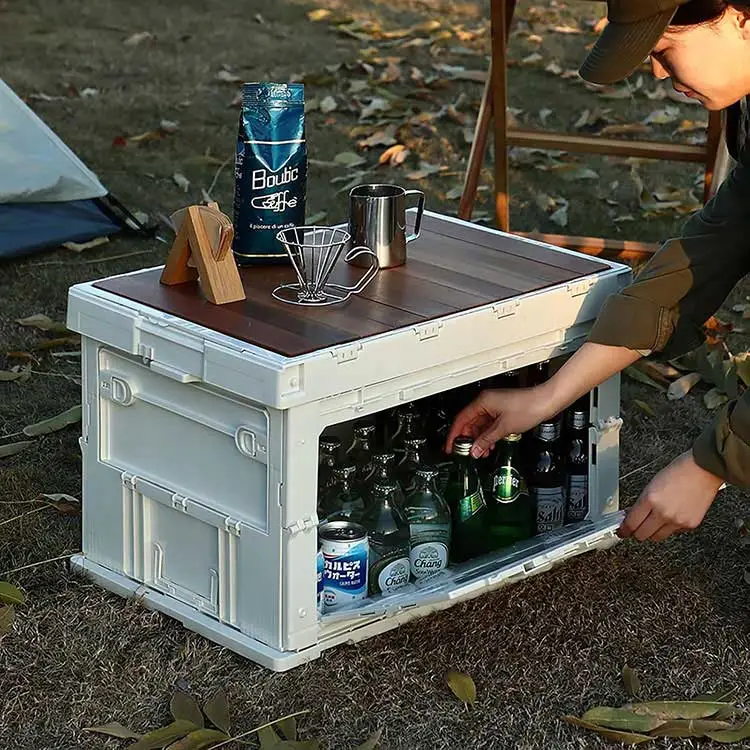What Materials Are Best for a Camping Folding Box?
2024-10-12
Camping folding boxes are essential for outdoor enthusiasts, offering a portable, compact, and efficient way to store and organize gear. The right materials can make a significant difference in the durability, weight, and overall performance of these boxes, ensuring they can withstand the rigors of the outdoors while being easy to carry and store. In this blog, we’ll explore the best materials for camping folding boxes and their specific benefits.
1. Plastic (Polypropylene or HDPE)
One of the most common materials used for camping folding boxes is plastic, specifically polypropylene (PP) or high-density polyethylene (HDPE). These plastics are known for their lightweight, durability, and water resistance, making them ideal for outdoor environments.
- Lightweight: Plastic folding boxes are easy to carry, even when loaded with camping gear.
- Durable: Both polypropylene and HDPE are tough and resistant to impacts, making the boxes less prone to cracking or breaking when dropped or handled roughly.
- Waterproof: Plastic is inherently water-resistant, ensuring your items stay dry in wet conditions or damp environments.
- Easy to clean: After a camping trip, plastic boxes can be easily wiped down or washed to remove dirt, mud, or spills.
Best for: Campers looking for lightweight, waterproof, and affordable storage solutions.

2. Aluminum
For those seeking a more rugged and long-lasting option, aluminum is an excellent material for camping folding boxes. While more expensive than plastic, aluminum offers enhanced durability and strength.
- Strong and durable: Aluminum folding boxes can withstand heavy loads and impacts without denting or deforming.
- Rust-resistant: Aluminum is naturally resistant to rust and corrosion, which is a critical feature for outdoor gear exposed to moisture.
- Lightweight yet sturdy: While stronger than plastic, aluminum is still relatively lightweight, making it a good option for those who prioritize durability without adding too much weight.
- Fire-resistant: Unlike plastic, aluminum is fire-resistant, which can be beneficial in camping scenarios where proximity to heat or fire is a concern.
Best for: Campers who need a strong, long-lasting, and fire-resistant solution for heavy-duty use.
3. Canvas with Reinforced Frames
Canvas is a traditional and highly durable fabric used for various camping gear, including folding boxes. Often, canvas folding boxes feature reinforced metal or plastic frames for additional structure and support.
- Durable and tear-resistant: Canvas is known for its strength and resistance to tearing, making it suitable for rugged outdoor use.
- Flexible and foldable: Canvas folding boxes can collapse down easily when not in use, saving space in your camping gear.
- Lightweight: Canvas is a relatively lightweight material, making it easy to carry around.
- Breathable: Unlike plastic, canvas allows airflow, which can help prevent moisture buildup or the development of mold in humid conditions.
- Water-resistant coatings: Many canvas folding boxes are treated with water-resistant coatings or wax to protect the contents from light rain or splashes.
Best for: Campers who need a lightweight, flexible, and space-saving solution, with some level of water resistance.
4. Fabric with Mesh Panels
Fabric folding boxes, often made from nylon or polyester, are popular for their lightweight design and portability. Some models include mesh panels for breathability, which is especially useful for storing items that need air circulation.
- Lightweight and portable: These materials are incredibly light, making them easy to carry even over long distances.
- Breathability: Mesh panels allow air to circulate inside the box, preventing condensation and reducing odors, especially for wet or damp items like clothing or shoes.
- Water-resistant: Nylon and polyester are water-resistant, and some versions come with additional waterproof coatings for better moisture protection.
- Flexible storage: Fabric folding boxes are highly collapsible and easy to store when not in use.
Best for: Campers looking for lightweight, breathable, and space-saving storage for clothes, food, or smaller gear.
5. Composite Materials
Some folding boxes are made from composite materials, which combine different elements such as plastic, wood fibers, or even recycled materials. These are designed to offer a balance between strength, durability, and environmental sustainability.
- Durable and sturdy: Composite materials often combine the strength of wood or fiber with the flexibility of plastic, offering a good balance between weight and durability.
- Eco-friendly: Many composite boxes use recycled or sustainable materials, making them a great option for environmentally conscious campers.
- Water-resistant: Depending on the specific blend of materials, composite folding boxes can offer excellent water resistance, similar to plastic.
Best for: Eco-conscious campers who want a strong, durable, and environmentally friendly option.
6. Wood
Although less common in modern camping gear, some folding boxes use lightweight wood or plywood for their construction. These boxes tend to be heavier than plastic or aluminum but offer a rustic, sturdy feel.
- Sturdy and strong: Wood boxes are highly durable and can carry heavy loads without warping or breaking.
- Aesthetic appeal: Wood has a natural, rustic appearance that can appeal to campers seeking a classic, nature-inspired aesthetic.
- Sustainable: Wood is a renewable resource, making it a more sustainable option compared to synthetic materials.
However, wood folding boxes can be heavier and less water-resistant than plastic or aluminum, making them more suitable for dry camping conditions or car camping where weight is less of an issue.
Best for: Campers who value aesthetics and sturdiness over portability and weight, and those camping in drier environments.
7. ABS Plastic (Acrylonitrile Butadiene Styrene)
ABS plastic is another option for high-quality folding boxes. Known for its toughness and resistance to various weather conditions, ABS is commonly used in outdoor gear and storage solutions.
- Durable and impact-resistant: ABS plastic can handle tough outdoor conditions and frequent use.
- Weather-resistant: ABS has good resistance to temperature changes, UV rays, and moisture, making it ideal for long-term outdoor use.
- Lightweight: Despite its toughness, ABS is relatively light and easy to carry.
Best for: Campers looking for a lightweight, weather-resistant, and durable option for all-weather use.
Conclusion
When choosing a camping folding box, it’s essential to consider the material that best suits your camping needs. Plastic offers a lightweight, water-resistant, and cost-effective solution, while aluminum provides strength and durability for heavy-duty use. Canvas and fabric options are great for lightweight, breathable storage, while composite materials provide an eco-friendly alternative. Each material has its own unique benefits, so choose based on your specific camping conditions, whether you're hiking, car camping, or spending an extended time in nature.


